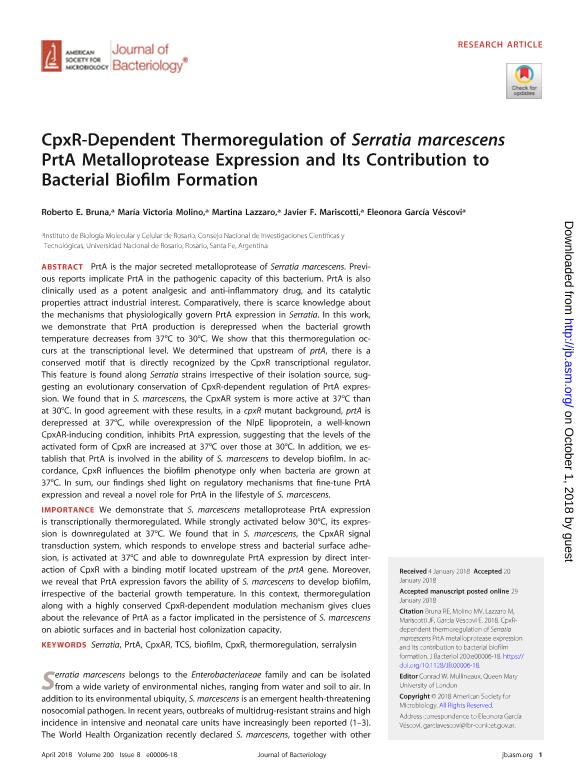Mostrar el registro sencillo del ítem
dc.contributor.author
Bruna, Roberto Emanuel

dc.contributor.author
Molino, María Victoria

dc.contributor.author
Lazzaro, Martina

dc.contributor.author
Mariscotti, Javier Fernando

dc.contributor.author
Garcia Vescovi, Eleonora

dc.date.available
2019-11-28T22:55:52Z
dc.date.issued
2018-04
dc.identifier.citation
Bruna, Roberto Emanuel; Molino, María Victoria; Lazzaro, Martina; Mariscotti, Javier Fernando; Garcia Vescovi, Eleonora; CpxR-dependent thermoregulation of Serratia marcescens PrtA metalloprotease expression and its contribution to bacterial biofilm formation; American Society for Microbiology; Journal of Bacteriology; 200; 8; 4-2018; 1-18
dc.identifier.issn
0021-9193
dc.identifier.uri
http://hdl.handle.net/11336/90867
dc.description.abstract
PrtA is the major secreted metalloprotease of Serratia marcescens. Previous reports implicate PrtA in the pathogenic capacity of this bacterium. PrtA is also clinically used as a potent analgesic and anti-inflammatory drug, and its catalytic properties attract industrial interest. Comparatively, there is scarce knowledge about the mechanisms that physiologically govern PrtA expression in Serratia. In this work, we demonstrate that PrtA production is derepressed when the bacterial growth temperature decreases from 37°C to 30°C. We show that this thermoregulation occurs at the transcriptional level. We determined that upstream of prtA, there is a conserved motif that is directly recognized by the CpxR transcriptional regulator. This feature is found along Serratia strains irrespective of their isolation source, suggesting an evolutionary conservation of CpxR-dependent regulation of PrtA expression. We found that in S. marcescens, the CpxAR system is more active at 37°C than at 30°C. In good agreement with these results, in a cpxR mutant background, prtA is derepressed at 37°C, while overexpression of the NlpE lipoprotein, a well-known CpxAR-inducing condition, inhibits PrtA expression, suggesting that the levels of the activated form of CpxR are increased at 37°C over those at 30°C. In addition, we establish that PrtA is involved in the ability of S. marcescens to develop biofilm. In accordance, CpxR influences the biofilm phenotype only when bacteria are grown at 37°C. In sum, our findings shed light on regulatory mechanisms that fine-tune PrtA expression and reveal a novel role for PrtA in the lifestyle of S. marcescens.
dc.format
application/pdf
dc.language.iso
eng
dc.publisher
American Society for Microbiology

dc.rights
info:eu-repo/semantics/openAccess
dc.rights.uri
https://creativecommons.org/licenses/by-nc-sa/2.5/ar/
dc.subject
BIOFILM
dc.subject
CPXAR
dc.subject
CPXR
dc.subject
PRTA
dc.subject
SERRALYSIN
dc.subject
SERRATIA
dc.subject
TCS
dc.subject
THERMOREGULATION
dc.subject.classification
Biología Celular, Microbiología

dc.subject.classification
Ciencias Biológicas

dc.subject.classification
CIENCIAS NATURALES Y EXACTAS

dc.title
CpxR-dependent thermoregulation of Serratia marcescens PrtA metalloprotease expression and its contribution to bacterial biofilm formation
dc.type
info:eu-repo/semantics/article
dc.type
info:ar-repo/semantics/artículo
dc.type
info:eu-repo/semantics/publishedVersion
dc.date.updated
2019-10-21T19:58:31Z
dc.journal.volume
200
dc.journal.number
8
dc.journal.pagination
1-18
dc.journal.pais
Estados Unidos

dc.description.fil
Fil: Bruna, Roberto Emanuel. Consejo Nacional de Investigaciones Científicas y Técnicas. Centro Científico Tecnológico Conicet - Rosario. Instituto de Biología Molecular y Celular de Rosario. Universidad Nacional de Rosario. Facultad de Ciencias Bioquímicas y Farmacéuticas. Instituto de Biología Molecular y Celular de Rosario; Argentina
dc.description.fil
Fil: Molino, María Victoria. Consejo Nacional de Investigaciones Científicas y Técnicas. Centro Científico Tecnológico Conicet - Rosario. Instituto de Biología Molecular y Celular de Rosario. Universidad Nacional de Rosario. Facultad de Ciencias Bioquímicas y Farmacéuticas. Instituto de Biología Molecular y Celular de Rosario; Argentina
dc.description.fil
Fil: Lazzaro, Martina. Consejo Nacional de Investigaciones Científicas y Técnicas. Centro Científico Tecnológico Conicet - Rosario. Instituto de Biología Molecular y Celular de Rosario. Universidad Nacional de Rosario. Facultad de Ciencias Bioquímicas y Farmacéuticas. Instituto de Biología Molecular y Celular de Rosario; Argentina
dc.description.fil
Fil: Mariscotti, Javier Fernando. Consejo Nacional de Investigaciones Científicas y Técnicas. Centro Científico Tecnológico Conicet - Rosario. Instituto de Biología Molecular y Celular de Rosario. Universidad Nacional de Rosario. Facultad de Ciencias Bioquímicas y Farmacéuticas. Instituto de Biología Molecular y Celular de Rosario; Argentina
dc.description.fil
Fil: Garcia Vescovi, Eleonora. Consejo Nacional de Investigaciones Científicas y Técnicas. Centro Científico Tecnológico Conicet - Rosario. Instituto de Biología Molecular y Celular de Rosario. Universidad Nacional de Rosario. Facultad de Ciencias Bioquímicas y Farmacéuticas. Instituto de Biología Molecular y Celular de Rosario; Argentina
dc.journal.title
Journal of Bacteriology

dc.relation.alternativeid
info:eu-repo/semantics/altIdentifier/url/http://jb.asm.org/lookup/doi/10.1128/JB.00006-18
dc.relation.alternativeid
info:eu-repo/semantics/altIdentifier/doi/http://dx.doi.org/10.1128/JB.00006-18
Archivos asociados
